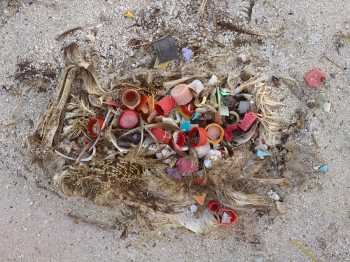Peter Ryan (FitzPatrick Institute University of Cape Town, South Africa) has provided a commentary in the journal Environmental Pollution on residence times of plastic items ingested by procellariiform seabirds.
The paper’s abstract follows:
“Understanding how rapidly seabirds excrete or regurgitate ingested plastic items is important for their use as monitors of marine debris. van Franeker and Law (2015) inferred that fulmarine petrels excrete ∼75% of plastic particles within a month of ingestion based on decreases in the amounts of plastic in the stomachs of adult petrels moving to relatively clean environments to breed. However, similar decreases occur among resident species due to adults passing plastic loads to their chicks. The few direct measures of wear rates and retention times of persistent stomach contents suggest longer plastic residence times in most albatrosses and petrels. Residence time presumably varies with item size, type of plastic, the amount and composition of other persistent stomach contents, and the size at which items are excreted, which may vary among taxa. Accurate measures of ingested plastic retention times are needed to better understand temporal and spatial patterns in ingested plastic loads within marine organisms, especially if they are to be used as indicators of plastic pollution trends.”

Ingested plastic artefacts within a decomposed corpse of a Laysan Albatross chick on Midway Atoll, photograph by Chris Jordan
Click here to access the Van Franeker & Law (2015) paper.
Reference:
Ryan, P.G. 2015. How quickly do albatrosses and petrels digest plastic particles? Environmental Pollution doi:10.1016/j.envpol.2015.08.005.

 English
English  Français
Français  Español
Español